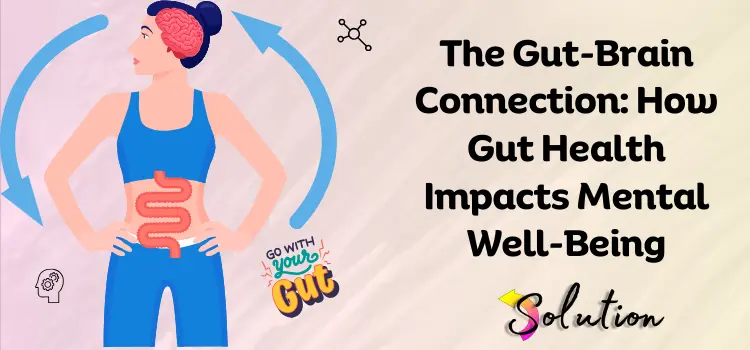The Gut-Brain Connection: How Your Gut Health Affects Your Mind

Introduction
The Gut-Brain Connection between the gut and the brain is more profound than most people realize. Known as the gut-brain axis, this complex communication system links the digestive system with the central nervous system, playing a crucial role in mental health, mood regulation, and cognitive function. Emerging research highlights how gut microbiota, the trillions of microorganisms in the digestive tract, influence brain health and overall well-being. Understanding this connection can help improve both mental and digestive health, leading to a better quality of life.
Understanding the Gut-Brain Axis
The gut-brain axis (GBA) refers to the bidirectional communication between the gut and the brain. This interaction occurs through multiple pathways, including:
1. The Vagus Nerve
The vagus nerve, the longest cranial nerve, acts as a direct link between the gut and brain. It transmits signals related to digestion, stress, and emotions. A healthy gut sends positive signals to the brain, promoting mental clarity and emotional balance.
2. Neurotransmitters and Hormones
The gut produces neurotransmitters that affect brain function. For example:
-
Serotonin – About 90% of serotonin, the “happiness hormone,” is produced in the gut, influencing mood and anxiety levels.
-
Dopamine – Associated with motivation and pleasure, dopamine production is also regulated by gut bacteria.
-
GABA (Gamma-Aminobutyric Acid) – Helps control anxiety and stress, with gut microbiota playing a role in its synthesis.
3. The Immune System
A significant portion of the immune system resides in the gut. A healthy gut prevents inflammation, which, when chronic, can contribute to neurodegenerative diseases like Alzheimer’s and depression.
4. Gut Microbiome and Mental Health
The gut microbiome, consisting of trillions of bacteria, fungi, and viruses, plays a major role in regulating brain function. A balanced microbiome supports:
-
Reduced stress and anxiety
-
Improved cognitive function
-
Better emotional regulation
How Gut Health Impacts Mental Well-Being
1. Anxiety and Depression
Studies show that individuals with imbalanced gut bacteria often experience symptoms of anxiety and depression. An unhealthy gut may lead to inflammation and disrupt serotonin production, worsening mood disorders.
2. Cognitive Function and Memory
A well-balanced gut microbiome enhances memory, concentration, and cognitive performance. Probiotics and prebiotics improve brain plasticity and reduce cognitive decline.
3. Stress Response
A healthy gut helps regulate the body’s stress response by maintaining a balance in cortisol levels. Poor gut health can lead to excessive stress, fatigue, and brain fog.
4. Sleep Quality
Since serotonin is a precursor to melatonin, the sleep hormone, gut health directly affects sleep patterns and quality. A poor gut microbiome can contribute to insomnia and restless nights.
Ways to Improve Gut Health for a Stronger Mind
1. Eat a Gut-Friendly Diet
Nourishing your gut with the right foods is essential for mental and physical health. Include:
-
Probiotic-rich foods – Yogurt, kefir, sauerkraut, kimchi, and miso
-
Prebiotic foods – Bananas, garlic, onions, asparagus, and oats
-
High-fiber foods – Whole grains, legumes, fruits, and vegetables
-
Healthy fats – Omega-3 fatty acids from salmon, flaxseeds, and walnuts
2. Reduce Processed Foods and Sugar
Excessive processed foods, artificial sweeteners, and refined sugar disrupt gut microbiota, leading to inflammation and mental health issues.
3. Manage Stress Effectively
Chronic stress negatively impacts the gut-brain connection. Incorporate stress-reducing techniques like:
-
Meditation and mindfulness
-
Regular exercise
-
Adequate sleep
-
Deep breathing exercises
4. Stay Hydrated
Drinking enough water supports digestion, maintains gut lining integrity, and helps in the smooth communication of the gut-brain axis.
5. Consider Probiotics and Supplements
Probiotic and prebiotic supplements can restore healthy gut flora and improve mood, digestion, and cognitive function.
Conclusion
The gut-brain connection is a vital aspect of overall health. By improving gut health through a nutritious diet, stress management, and lifestyle changes, we can enhance mental clarity, emotional stability, and cognitive performance. Prioritizing gut health isn’t just about digestion—it’s a key to a healthier mind and body.
Read More : Onelane Solution

- Art
- Causes
- Crafts
- Dance
- Drinks
- Film
- Fitness
- Food
- Игры
- Gardening
- Health
- Главная
- Literature
- Music
- Networking
- Другое
- Party
- Religion
- Shopping
- Sports
- Theater
- Wellness


